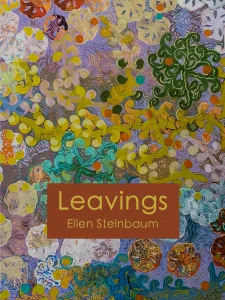Leavings by Ellen Steinbaum 2024
I’ll begin by acknowledging that Ellen has been a friend for nearly two decades, one with whom I enjoy discussing books and reading and one who in this her fifth book of poetry, has provided hours of wonderful reading. While I’m very fond of her and her husband, I don’t believe that friendship has colored my reading of her work—it’s just plain wonderful!
In “Leavings”, Steinbaum has collected 58 poems, most only a single page, into a beautiful, powerful, and thought-provoking volume. Her span of interest is quite remarkable pivoting from a poem about cockroaches, observing that the cockroach’s practice of eating their mate’s wings is seen by her as “an endearing way to start a life/together, showing you will never fly away” to a poem entitled “Belonging” in which she observes our human instinct to assign order and rank stimulated by seeing a mouse ‘skittering’ across the floor.
When I review a book of poetry, I’m sometimes frustrated by my inability to quote every wonderful poem or at least the lines, phrases, stanzas that have made me stop, re-read, and re-read again. Such was my experience with “Leavings”. From a poem based on the ads for companions in the newspaper to one making the analogy between our family ties and the fungal network critical for the survival of Douglas firs, this is a book that demands re-reading in order to fully appreciate Steinbaum’s wide range of knowledge and emotion and her ability to transfer those elements to the written word on the page.
I especially loved the two epigraphs at the beginning of the book, one by my perennial favorite Virginia Woolf and the other by the contemporary folk/rock singer Brandi Carlisle. Woolf is quoted thus: “Doesn’t one always think of the past, in a garden with men and women lying under the trees? Aren’t they one’s past, all that remains of it, those men and women, those ghosts lying under the trees….one’s happiness, one’s reality.” Carlisle’s quote follows: “I may not be around tomorrow.”
Life, family, loss, mortality—Steinbaum puts it all together in “Leavings”. I think you’ll find it quite wonderful.



